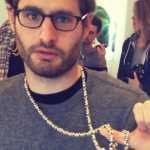
This Saturday, October 2, 2011, Carmichael Gallery opens a special exhibition pairing legendary LA street photographers, father and son, Eriberto and Estevan Oriol. While documenting similar subjects, Eriberto and Estevan have carved unique, individual paths in the arts. Estevan is famous for his famed work with the Soul Assasins crew and cut his teeth at Cyprus Hill's tour manager. His father, always modest, is represented in the perminant collection of the Museum of Contemporary Art, Los Angeles.
Both men have taken illuminating photographs of LA's low rider culture and the city's gang life. In total, Like Father, Like Son shares 50 images with equal number for each artist.
Like Father, Like Son opens on October 2 and runs through October 29, 2011.
Carmichael Gallery, 5795 Washington Ave, Culver City, CA.
Ahead of the exhibition opening, Complex caught up with Estevan and Eriberto to talk photography and familial pride. Click next to read the interview.
What does LA mean to you?
Estevan: LA means home to me; it's where I was born and raised. I have been to 53 countries, plus all the states, and I've loved everywhere I've gone. Traveling is great, in my opinion, but I don't think I could do all I'm doing anywhere but LA. It's really the land of all opportunities here - thats why it's full of people who aren't from LA. Even though they cry and complain about it, THEY'RE STILL HERE. I LOVE LA.
Eriberto: I know I not only live in a very special place, but in paradise. I don't need to travel around the world. Man, it's right here. All the nationalities and cultures from around the globe are represented right here in my own backyard. This is the true beauty of LA!
How do you know when the scene is right to document?
Eriberto: I don't, for the most part. Since I'm basically a street shooter, opportunities just present
themselves in the moment. Man, I just go with the flow, hope for the best and await the surprise.
Estevan: I just take pictures of stuff. If I go to a specific place for an assignment, then I know what to document, but as far as taking photos, I shoot nearly everything I see nowadays, because you never know what it will be like in 10 years. Even if i don't really like the way something looks at the time, that same thing might be cool in 10 years. I've missed a lot of good stuff, and I don't want to miss any more.

Estevan Oriol, Bullet Holes and Stab Wounds, 2002. (c) Estevan Oriol
What's your favorite car and why?
Eriberto: Don't have one. A car is a car and it will get you from A to Z as any other. My car is my feet. Ralph Waldo Emerson said, “The civilized man has built a coach, but has lost the use of his feet.” Put this in our time: “Men and women have built the car and lost the use of their feet.” This is why so many people have major health issues. I love to walk the streets of LA, especially downtown, because the whole world comes through it and it's engaging!
Estevan: I love my 64, even though she gives me headaches. She's a woman, so she's supposed to - but man she makes me feel good when I'm rollin her. My 47 Fleetline just is old school - it doesn't get better than that. It only goes 60 mph so you just cruise. My 2006 Road King - I wish I could drive that everyday. I miss my Cadillac DTS'. For now I have an all black outfitted Dodge Ram 1500 with a super chip that I roll for work. He's mean. I like him.
What's the most important thing you've learned from your father/son?
Estevan: Pops always had me around some kind of art whenever we spent time together, but he never pushed it on me. When he and his wife Angelica gave me the camera, they just said, “You are into some cool shit - you should take some photos of it.” At that time, I was tour managing House of Pain and lowriding with my club, Lifestyle Car club. The rest is history. My family didn't have much growing up so I think that's what gave me my drive. Stand for something or fall for everything.
Eriberto: What's the most important thing I've learned from my son? Absolutely nothing! Just messing with you. He is so good at sucking you in emotionally into the character of a person. He brings the people he shoots right up into your face. This is what separates him from the pack, including me. When I'm working with or around him, I shadow him and know he's going to take me where I need to go. I just follow his rhythm as the poet the word.

Eriberto Oriol, Rain In LA, 2011. (c) Eriberto Oriol
How do you balance commercial and personal work?
Eriberto: I don't. This is what differentiates me and my beloved son, Estevan. He can work comfortably on both sides of the fence. He is an entrepreneur as well as an artist. Andy Warhol said something about it being great when art is commercial and when commercial is art. Me, I'm still working on this one, but like the turtle, I'm not about being first, but about enduring.
Estevan: Thats easy - I shoot some personal stuff every single day. It might be 1 shot or 10 rolls, but i make sure I do something. I have presently shot over 300,000 photos and my goal is 1,000,000. When I'm not doing that, I'm hustling my ass off thinking of ways to get commercial work to pay all these mother fuckin bills.
Any words of wisdom for aspiring photographers?
Eriberto: Just do it, as the saying goes. Don't worry about all the technical shit. Go with your gut and trust your eye. If you saw what most of my photos looked like after a shoot, you would say, like I do many times, “You screwed up.” But at the same time, I don't want everything to be just right. That's boring to me. My photos come alive in the darkroom or in photoshop. I don't take pictures, I make them. Anyway, you can always hire a tech or hustle one if that's a call you need to make.
Estevan: Be original! Get ready, because taking a picture is the easiest part. The rest of it is hard.
Favorite photograph taken by your father/son?
Estevan: I like a lot of them: The Thinker, America's Most Wanted, The Miners, shots he took of the underground metro in LA being built, his downtown street stuff...
Eriberto: I don't have a favorite. I gave that one up quite a while ago and that's because I have several and this works for me. The universe is not one thing; it is a multitude of many. I don't believe that you've got to put your all into the one. For me, that's tunnel vision and only takes you down a one-way-street.
Favorite photograph of your own?
Estevan: Impossible, I like so many of them. The street stuff, music, women, traveling, celebrities...
Eriberto: Same thing applies here. I have no one favorite. Since I mostly shoot the streets and the people I encounter there or bring there, all of this spices life and is the richness of Los Angeles. The grotesque, the beast and the beauty all of these various elements feeds and expand my horizons. So each image unfolds itself before my eyes as does a garden of roses.

Estevan Oriol, 76 Caprice Scraping, 1997. (c) Estevan Oriol.
How do you define beauty?
Estevan: Life.
Eriberto: Every kernel of life has its beauty. Just turn over the rock and it will reveal itself.
Which of your shoots has been most memorable and why?
Estevan: To the world, hands down the LA FINGERS shot that so many have gotten
inspiration from. That shot has definitely put me on the map worldwide. I took it in 1995 in downtown LA.
Eriberto: Again, I have no single one, but several. I love shooting behind the scenes of Estevan, I love shooting street people, beautiful woman, architecture, graffiti, etc. I must say street people passionately grab me, maybe because I know what it's like to be first hand in their situation. It's no trip. It's a bitch and it's no party when you've been pulled down into the bowels of the city. It leaves an imprint on your forehead that you never forget. We each come into this world full of piss, wind and fire, but what happens with our lives depends on us. When things around you come tumbling down, you can either get up and dust yourself off, bite the dust or live a "life of quiet desperation." This is what my artwork for the most part represents.

Eriberto Oriol, Need A Helping Hand, 2000. (c) Eriberto Oriol

